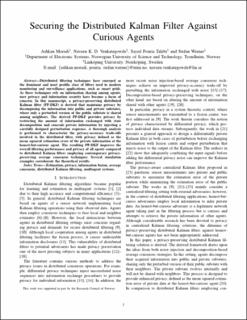| dc.contributor.author | Moradi, Ashkan | |
| dc.contributor.author | Dasanadoddi Venkategowda, Naveen Kumar | |
| dc.contributor.author | Talebi, Sayedpouria | |
| dc.contributor.author | Werner, Stefan | |
| dc.date.accessioned | 2022-03-30T08:03:03Z | |
| dc.date.available | 2022-03-30T08:03:03Z | |
| dc.date.created | 2022-01-14T10:22:20Z | |
| dc.date.issued | 2021 | |
| dc.identifier.citation | 2021 IEEE 24th International Conference on Information Fusion (FUSION) | en_US |
| dc.identifier.isbn | 978-1-7377497-1-4 | |
| dc.identifier.uri | https://hdl.handle.net/11250/2988496 | |
| dc.description.abstract | Distributed filtering techniques have emerged as the dominant and most prolific class of filters used in modern monitoring and surveillance applications, such as smart grids. As these techniques rely on information sharing among agents, user privacy and information security have become a focus of concern. In this manuscript, a privacy-preserving distributed Kalman filter (PP-DKF) is derived that maintains privacy by decomposing the information into public and private substates, where only a perturbed version of the public substate is shared among neighbors. The derived PP-DKF provides privacy by restricting the amount of information exchanged with state decomposition and conceals private information by injecting a carefully designed perturbation sequence. A thorough analysis is performed to characterize the privacy-accuracy trade-offs involved in the distributed filter, with privacy defined as the mean squared estimation error of the private information at the honest-but-curious agent. The resulting PP-DKF improves the overall filtering performance and privacy of all agents compared to distributed Kalman filters employing contemporary privacy-preserving average consensus techniques. Several simulation examples corroborate the theoretical results. | en_US |
| dc.language.iso | eng | en_US |
| dc.publisher | IEEE | en_US |
| dc.relation.ispartof | 24th International Conference on Information Fusion (FUSION) | |
| dc.title | Securing the Distributed Kalman Filter Against Curious Agents | en_US |
| dc.type | Chapter | en_US |
| dc.description.version | acceptedVersion | en_US |
| dc.rights.holder | © 2021 IEEE. Personal use of this material is permitted. Permission from IEEE must be obtained for all other uses, in any current or future media, including reprinting/republishing this material for advertising or promotional purposes, creating new collective works, for resale or redistribution to servers or lists, or reuse of any copyrighted component of this work in other works. | en_US |
| dc.identifier.doi | 10.23919/FUSION49465.2021.9627034 | |
| dc.identifier.cristin | 1980999 | |
| dc.relation.project | Norges forskningsråd: 300102 | en_US |
| dc.relation.project | Norges forskningsråd: 274717 | en_US |
| cristin.ispublished | true | |
| cristin.fulltext | postprint | |
| cristin.qualitycode | 1 | |
